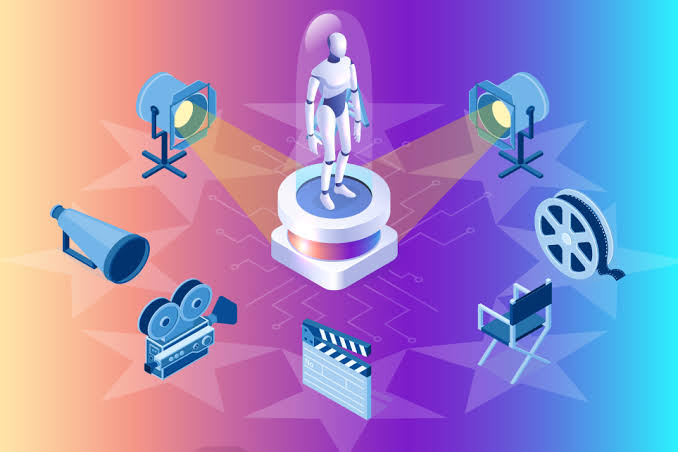Explore the transformative impact of AI automation on the media and entertainment industry. Discover how AI enhances content creation, streamlines distribution, and boosts audience engagement while addressing challenges such as job displacement, misinformation, and privacy concerns.
The Influence of AI Automation, on Media and Entertainment
Artificial Intelligence (AI) is making waves in industries and the realm of media and entertainment is no different. The incorporation of AI powered automation is revolutionizing the way content is produced shared and enjoyed presenting a mix of opportunities and obstacles. This in depth examination delves into the impact of AI automation on the media and entertainment sector covering aspects such as content creation, distribution, audience interaction and ethical dilemmas.
AI in Content Creation
The use of AI automation is transforming how content is created by simplifying workflows and boosting creativity. In fields like writing scripts, composing music and editing videos AI technology is being utilized to support and enhance human ingenuity. For example AI algorithms can analyze data to come up with ideas or propose plot twists based on trends and audience preferences. This not speeds up the process. Also ensures that creators stay in tune with market demands.
In the realm of music production AI tools can create music by studying existing patterns and genres. These tools can generate melodies, harmonies and even full compositions providing musicians and producers with opportunities to explore. Similarly AI powered video editing software can streamline tasks like adjusting colors, transitioning between scenes and summarizing videos. This allows editors to concentrate on aspects of their craft.
AI plays a role, in content creation including visual effects (VFX) and animation. AI algorithms can produce animations and effects that used to be time consuming to create by hand. For instance AI can generate realistic digital characters or mimic occurrences in physics which streamlines the production process and cuts down on expenses.
AI in Distribution and Personalization
The influence of AI automation is seen in how content is shared and personalized. Streaming services and media firms use AI algorithms to suggest content to users based on their viewing habits, likes and actions. These recommendation systems improve user satisfaction by offering customized content recommendations boosting engagement and keeping viewers coming back.
AI powered analytics tools assist media companies in gaining insights, into audience behavior. By examining data from sources such as media, viewership metrics and demographic details AI can spot patterns and preferences. This knowledge enables companies to make informed choices regarding content production, marketing approaches and distribution methods.
Moreover AI automation streamlines management and distribution processes. Automated systems can handle tasks like labeling content, generating metadata and even localizing material. For example AI can translate and add subtitles to content in languages, broadening its appeal to global audiences. This automation not saves time and resources but also ensures consistency and accuracy in delivering content.
Audience Interaction and Engaging Experiences
Artificial intelligence is revolutionizing how we connect with audiences by enabling immersive and interactive encounters. Technologies like reality (VR) and augmented reality (AR) are being combined with AI to develop captivating and participatory content. For instance AI powered chatbots and virtual assistants can engage users by offering recommendations addressing inquiries and enhancing overall interaction.
Another area where AI is making a difference is in storytelling. AI driven platforms can generate narratives that adapt based on user decisions and actions providing an experience. This storytelling approach allows audiences to shape the content's direction resulting in a lively and interactive entertainment format.
Moreover AI plays a role in developing deepfake technology capable of producing lifelike digital content that resembles individuals. Although this innovation holds promise, in fields like entertainment by crafting avatars or resurrecting figures for learning opportunities it also sparks discussions regarding its potential for misuse and ethical considerations.
Ethical Considerations and Challenges
The integration of AI automation in the media and entertainment sector raises ethical dilemmas and challenges. One significant worry is the potential impact on employment. As AI technology advances in performing tasks traditionally done by people theres a risk of job opportunities for those in creative fields. This shift calls for a focus on retraining and upskilling to help workers adjust to the evolving landscape.
Another ethical concern involves the use of AI in generating and manipulating content. The rise of deepfakes and other forms of media can result in misinformation and misuse of identities. Its crucial to ensure that AI generated content is used responsibly and transparently to uphold trust and integrity in the media.
Privacy also stands out as a concern, particularly with AI systems that gather and analyze vast amounts of user data. Protecting user information and ensuring that data is handled ethically and securely are vital steps in safeguarding privacy and maintaining public confidence.
The oversight and management, of AI in the media and entertainment sectors are essential to tackle ethical issues and obstacles. It's vital to create structures and rules that promote AI usage while encouraging creativity for the industries progress.
In Conclusion
The influence of AI automation on the media and entertainment sector is significant reshaping how content is created, distributed and how audiences are engaged. By incorporating AI tools creativity is boosted distribution processes are streamlined and interactive experiences are made possible. However the use of AI also raises ethical dilemmas and challenges such as job displacement, the spread of misinformation and privacy issues. Addressing these concerns while leveraging the advantages of AI demands thought consideration and balanced strategies to ensure technology acts as a force, in the industry.
